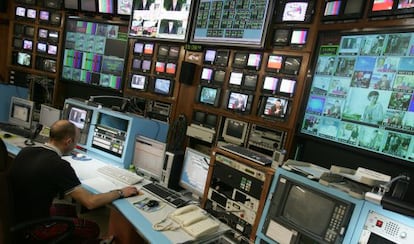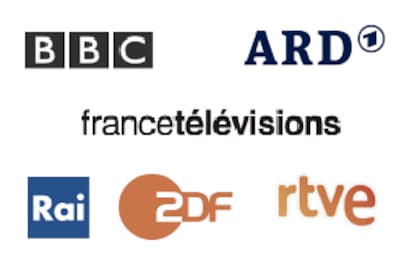What now for Spain’s public broadcaster?
Rising debts, political interference and plummeting audiences. RTVE needs urgent attention

RTVE, Spain’s public broadcaster, is in the midst of an unprecedented crisis. Its chairman, Leopoldo González-Echenique, resigned in September, three months after the company’s director, Ignacio Corrales, was sacked and its board told they risked joining him. The state entity has debts of more than €700 million and continues to lose money, even after the government agreed to a €130-million lifeline, funded by the taxpayer. In turn, many of the organization’s own journalists accuse the government of political interference, isolating reporters and staff it sees as hostile, and in this, an election year, of creating its own news team. Meanwhile, the audience share of RTVE’s two TV channels has fallen by more than half to around 10 percent over the last decade.
RTVE is not playing the role normally associated with state broadcasters: to provide impartial news and programming at a reasonable cost to the taxpayer
In short, RTVE is not playing the role normally associated with state broadcasters, which in a democracy is above all to provide impartial news and programming at a reasonable cost to the taxpayer.
“State television works if it avoids controversy and the taxpayer understands that it is a public service, just like hospitals, roads, and education,” says Alonso Sánchez-Tabernero, a professor of Information Enterprises, and rector of the University of Navarra, who points to the BBC as the model for public broadcasting.

“We have created a monster that is simply too big for the service it provides,” adds Lalo Azcona, a former newsreader at RTVE. “In the rest of Europe, state broadcasters are not an economic disaster, which is why nobody there is arguing about whether they should be closed down.”
The difficult financial situation at RTVE, which is now under the stewardship of José Antonio Sánchez, is in large part due to a massive drop in income. The first came in 2009 when the then prime minister, José Luis Rodríguez Zapatero decided it would no longer be able to show advertisements, taking away some €450 million in one fell swoop. The idea was that the private channels would contribute to funding RTVE from the extra advertising it was assumed they would pick up. But over the last five years, their contribution has steadily fallen. The second blow came when RTVE’s state funding was cut by 30 percent between 2010 and 2013 as part of government austerity measures.
The problem becomes more urgent by the month. Between 2012 and 204, its deficit grew from €112 million to €132 million. In November, the government proposed allowing RTVE to show advertising again.
Another possibility would be to follow the British and French model of paying some kind of license fee. “But nobody has ever dared to do so here,” says Alejandro Perales, president of the Association of Communication Consumers, and who says a mix of license fee, state funding, and limited advertising is the best solution.
The board is little more than a parliamentary commission; its members need to have a more professional profile”
Emili Prado of Barcelona’s Autonomous University says that a license would no longer work, given that people watch television on a variety of devices, and suggests some kind of pay-per-view system. “But not to make money,” he adds. “Only as a kind of subsidy.”
The other issue that has long plagued RTVE is its use by successive governments for their own political ends. The director of RTVE has traditionally been proposed by the government of the day, requiring only a simple majority of votes in Congress. “Since the times of Franco, and right through the transitional years to democracy and beyond, it has been used by the government of the day,” says Agustín García Matilla, professor of Audiovisual Communication at the University of Valladolid.
In a bid to break that pattern, José Luis Rodríguez Zapatero introduced legislation that required a two-thirds majority in Congress to elect the director of RTVE, thus requiring a candidate that was suitable to all parties. But this brief episode of impartiality à la BBC didn’t last long, and when the Popular Party took office in 2012, it reverted to the previous system.
The parliamentary commission is only interested in making sure that one party doesn’t get five minutes more air time than another”
Critics have called for the government to reinstall the two-thirds majority requirement for approval of the director of RTVE and its board. The appointment of José Antonio Sánchez has done little to instill any hope of impartiality. Formerly the head of Telemadrid – the capital’s regional channel, which has long been accused of being little more than a propaganda vehicle for the Popular Party, which has run Madrid for two decades – Sánchez has already run RTVE, and was criticized by the High Court for the broadcaster’s failure to cover the 2002 general strike during his time at the helm of the broadcaster.
“Editorial independence is essential,” says Enrique Bustamante, professor of Audiovisual Communication at the Complutense University of Madrid and a member of the committee set up in 2004 to come up with proposals to overhaul RTVE. He says that reinstalling the two-thirds vote in Congress is essential.
Teledetodos, which describes itself as a research group made up of media professionals and audiovisual communication experts and academics, says that RTVE’s board needs to be smaller, and to better reflect the interests of Spanish society, at the same time as exercising more strategic and direct control over the company.
“At present, the board is little more than a parliamentary commission; its members need to have a much more professional profile,” says Alejandro Perales, of the Association of Communication Consumers.
France and Britain’s state broadcasters have their own, independent boards whose job is to oversee service goals and to guarantee pluralism. This approach was behind the reform of the committee set up in 2004, but which was then dropped in 2006. Emili Prado and Miquel de Moragas of Barcelona’s Autonomous University argue that RTVE needs a board made up of experts from the world of television, along with what they call “social interpreters,” who would represent different groups in society. The current board, say the pair, is overshadowed by the National Markets and Competition Commission (CNMV), and has very little decision-making capacity.
“What’s more, the parliamentary commission is only interested in making sure that one party doesn’t get five minutes more air time than another,” says Prado, adding: “there has never been truly independent parliamentary control.”
RTVE’s programming model is also under question. “It is very dangerous when the directors of public broadcasters feel that their success or failure is measured solely in terms of viewing figures,” says Álex Martínez Roig, head of content at satellite broadcaster Canal Plus. Sánchez-Tabanero points to the Swedish model, where the state broadcaster’s programming is seen as complementing the private stations, and doesn’t have to bid to show major sporting events such as soccer. Agustín García Matilla of the University of Valladolid, also highlights the BBC’s longstanding links to education.
The lingering crisis has prompted some calls for RTVE to be privatized
The lingering crisis has prompted some calls for RTVE to be privatized. “This would bring an end to the waste, and there would be no more political interference,” says Carlos Rodríguez Braun, professor of History and Economic Thought at Madrid’s Complutense University. “But as long as it is not politically profitable, it will never be privatized.”
In the final analysis, the debate over public television depends on each country’s model. “In Europe, says Emili Prado, “state television works and is popular.” He says that in the digital age, politically independent television is more important than ever. If people only receive information from their circles within the social networks, their vision of reality is necessarily limited. “It is essential to build a wide range of content that we can share as a country,” concludes Prado.
Tu suscripción se está usando en otro dispositivo
¿Quieres añadir otro usuario a tu suscripción?
Si continúas leyendo en este dispositivo, no se podrá leer en el otro.
FlechaTu suscripción se está usando en otro dispositivo y solo puedes acceder a EL PAÍS desde un dispositivo a la vez.
Si quieres compartir tu cuenta, cambia tu suscripción a la modalidad Premium, así podrás añadir otro usuario. Cada uno accederá con su propia cuenta de email, lo que os permitirá personalizar vuestra experiencia en EL PAÍS.
¿Tienes una suscripción de empresa? Accede aquí para contratar más cuentas.
En el caso de no saber quién está usando tu cuenta, te recomendamos cambiar tu contraseña aquí.
Si decides continuar compartiendo tu cuenta, este mensaje se mostrará en tu dispositivo y en el de la otra persona que está usando tu cuenta de forma indefinida, afectando a tu experiencia de lectura. Puedes consultar aquí los términos y condiciones de la suscripción digital.









































